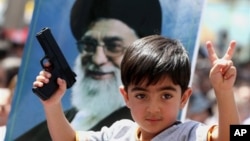Iranian forces killed three men allegedly linked to the Islamic State group Tuesday in a border town near Iraq, Iranian media reported.
The men were reportedly found hiding in a house in Kermanshah province, about 60 miles from the Iraqi border. Iranian forces also arrested six men accused of sympathizing with IS and seized belts armed with explosives and a weapons cache, Kermanshah province Governor Asadollah Razani was quoted as saying by state news agency IRNA.
Iranian Intelligence Minister Seyed Mahmoud Alavi told Iranian media that forces had killed an “instrumental” IS member and had prevented an IS cell from infiltrating from Iraq.
A mountainous area bordering Iraq, Kermanshah has a largely Sunni Kurdish population and a history of insurgency against Shi'ite Iran.
IS members are generally Sunni and view Shi'ites as heretics. From their bases in Syria and Iran, IS has been reaching into Iran, analysts say.
'Major enemy'
“IS has some interests in Iran and considers it as a major enemy,” said Paul Pillar, an analyst and 28-year veteran of the U.S. Central Intelligence Agency. “The demography of the region, which has been a base for insurgency in Iran, plays an important role within and prepares a good seedbed for IS to pursue its aims in this area.”
Iranian officials say IS militants have been targeting the country in recent months as Tehran has ramped up its military presence in both Iraq and Syria.
On Tuesday, Russia and Iran announced that Russian bombers have begun targeting IS in Syria from a base in Iran. The attacks also center on Syrian rebels battling the Syrian regime. Iran has sent elite forces to Syria in defense of the Syrian regime and helped Syrian troops gain a foothold against rebels.
“The Tehran-Damascus-Moscow axis victory over IS and other rebels in Syria has made the insurgents angry, so they try to retaliate, using all means,” said Mohammad Majeri, a Tehran-based scholar and analyst. “With their declining power in the region, IS and its allies have no other choice but to launch terrorist attacks here and there.”
Terror cells
Although IS has become weaker in Syria and Iraq from both U.S-allied assaults and Russian-led strikes, IS continues to spread terror cells throughout the Middle East and Europe.
“IS wants to show that it is not limited to Syria and Iraq and can launch attacks beyond these geographical territories,” Pillar said.
Iranian authorities say security forces have clashed with terrorist groups in recent months and have thwarted plots on the border and within the country, arresting several operatives and confiscating large amounts of explosives and bomb-making materials.
Iranian authorities last week executed 20 Kurds at the Rajai Shahr prison in Karaj for their alleged links to IS and other Sunni extremist groups.




